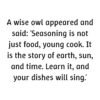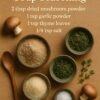$3.96 Original price was: $3.96.$1.48Current price is: $1.48.
Description
The Secret of the Forest – A Magical Mushroom Seasoning Story (Digital PDF Book)
Discover the finest Mushroom Ingredients Steps with Amir, a young cook who discovers the hidden power of mushrooms to transform every dish.
This digital CMYK PDF combines storytelling + practical value:
✨ A heartwarming tale inspired by nature and food.
✨ Perfect for both kids and adults who love fantasy and cooking.
✨ Includes bonus mushroom seasoning recipes at the end — simple, delicious blends you can make at home.
✨ Easy-to-read, beautifully formatted 27+ page PDF.
Whether you’re a foodie, a fantasy lover, or simply want a unique digital gift, this storybook is a delightful addition to your collection.
📥 Instant Download anywhere, anytime, and keep it forever.











